The return to travel is largely considered something to celebrate. But concerns about the physical and mental health implications are normal after more than a year of lockdowns. We find out why.
The intrinsic link between physical health and mental health has been a key talking point throughout a pandemic that has severely impacted both for many people.
Along with daily anxieties around a worldwide illness affecting millions, job losses and minimised social contact (to name just a few), the pandemic has called into question whether the most devastating consequences of coronavirus have been medical, economic or psychological.
So how might these newfound health concerns impact the travel industry beyond COVID?
The link between travel and mental health
Years before we started to properly understand the value of good mental health, holidaying was an important part of people’s happiness. According to Dr Helena McKeown, Chair of the Representative Body of the British Medical Association (BMA), COVID-19 has been an interesting case study. With travel revoked and movement minimised to localities only, it has allowed us to see the real impact of life limited to one place.
“In a more general sense, it’s become increasingly clear that people worked towards and looked forward to holidays,” says Helena. “It’s people's respite and relaxation - and for the past 12 months, we haven’t been able to get the rest we need.”
This in turn impacts our motivation, productivity, and general sense of life direction. So, what we’re all craving is a holiday - doctor’s orders. But thanks to an airborne virus that can also contaminate surfaces and optimally spreads person to person, the logistics that lie between the sun-soaked vision and the COVID-tainted reality can be somewhat daunting.
Let’s talk about public transport
It was everyone’s least favourite part of travel even before the backend of 2019, let’s be real. The ‘we aren’t paying to park at an airport for two weeks’ mentality that saw people hopping on buses, trains and metros any hour of the day or night. Dragging suitcases oversized and overpacked enough to put off even the most determined of potential thieves.
Then you find yourself occupying an overly-warm, coffee-infused waiting room with hundreds of other passengers and the reason everyone’s sweating is simple, because there are no windows in airports. Reminder at this point: you’re several hours into the journey and probably still within a 25 kilometre radius of your house.
And then there’s the plane itself, which - though not a critical part of fulfilling travel - is likely to factor in.
“There will understandably be some anxiety around getting on public transport,” Helena explains further. “Planes will likely be the main one - circulated air for hours at a time and the discomfort that comes with wearing masks for long periods.”
It’s no surprise that staycations, road trips and more local holidays are looking like they will be more popular than ever post-COVID.
Getting out and about while abroad
The industries which rely on tourism to survive have been a matter of serious concern in the past 12 months. Culture sites, theatres, restaurants and bars, museums among others have been struggling, with some having to close the doors for good. Those that have been able to stay afloat are longing for the day the crowds will return - but will it ever be the same?
According to this piece by National Geographic, the events of the past year have actually reshaped our sense of fear. Social distancing means we’ve been literally crossing streets to avoid being close to other people. It begs questions of how we will ever return to being shoulder-to-shoulder with a stranger in a packed-out venue.
While the future of indoor spaces remains unclear, it seems likely that until we have a majority-vaccinated global population, measures like social distancing, sanitising and face mask wearing will remain in place.
Vaccines are becoming key for the return of the travel industry
There’s been a lot in the news recently about vaccines: passports, their advantages and disadvantages and the progress that has been made in the past few months. But the rollout is already stalling because of public uncertainty and anxiety.
“We recently saw a halt in some countries across the continent on their vaccine rollout, as a result of some concerns around the AstraZeneca vaccine having adverse health implications,” says Helena. “It’s a complicated one, because while the issues needed time to be addressed appropriately, it means progress has been delayed in parts of Europe.”
As for vaccine passports, these in themselves are becoming a minefield for a social species that has spent a year segregated from family and friends because of COVID. The requirement of vaccine passports for travel and entering public spaces potentially eliminates freedom of choice in two ways:
- If you don’t want the vaccine for health or personal reasons
- Not having it subsequently limits your freedom of movement when compared to the fully vaccinated
For people who have been separated by borders especially, with many countries now opting in to some form of vaccine certification, this furthers the sense of division created by a Very Strange Year. Holidaying aside, the dilemma is reconciling how authorities can justify preventing people from travelling for personal, health and work reasons.
It’s normal to feel stressed
Worth mentioning here that we’re on our way out of one of the most testing human experiences in the history of time. It’s completely normal to feel like the world might be a bit much right now.
The return to travel means a return to crowds, human interaction, shared accommodation and transport - words that might make us cringe with discomfort right now. But it’s also a return to experiences, enriching adventures, new people and unexplored lands.
The world is waiting - and it’s not going anywhere fast. Take your time, stay in your comfort zone and take it one adventure at a time.
Every weekday at 21.00 CET, Euronews Travel brings you a story from somewhere different around the world. Download the Euronews app to get an alert for this and other breaking news. It's available on Apple and Android devices.




